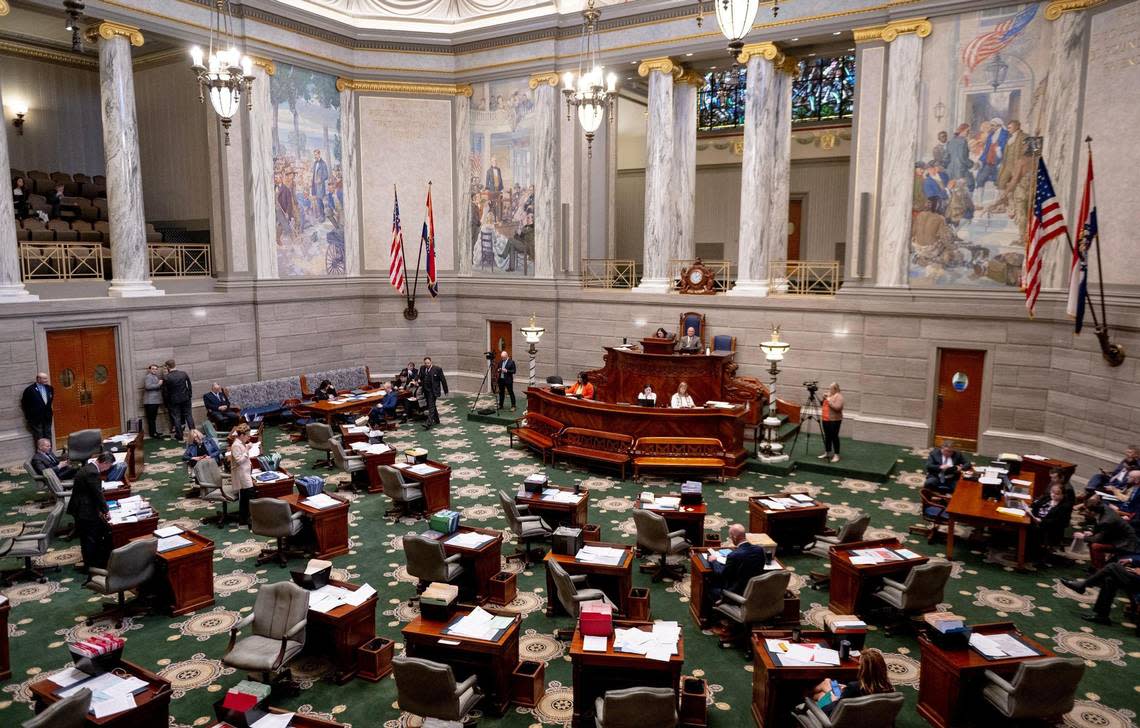Missouri Senate approves measure to make it harder for voters to amend state constitution

The GOP-controlled Missouri Senate on Thursday passed legislation that would make changing the state constitution more difficult, setting up a likely fight with the House over language intended to entice voters to approve the measure.
The proposal, filed by Sen. Mary Elizabeth Coleman, an Arnold Republican running for Congress, would weaken the power of urban residents’ votes on citizen-led amendments to the state constitution. It’s the first piece of legislation passed by the chamber this year and comes as abortion rights supporters pursue an amendment to overturn the state’s abortion ban.
The measure passed on a 22 to 9 vote, sending the legislation long sought by Republicans to the House. But it would also have to be approved by voters and the Senate version no longer includes two provisions designed to lure voters into voting in favor of the question.
An initial version would have asked voters to also ban foreign interference in ballot measures and allow only U.S. citizens to vote on constitutional amendments, two situations that are already illegal under federal or state law.
Democrats, attorneys and even Coleman, the bill sponsor, have referred to the extra provisions as “ballot candy,” a phrase in politics that refers to inserting unrelated but popular ideas into a measure to encourage people to vote in favor of it.
The proposal, as passed by the Senate, would require amendments to the state constitution be approved essentially twice, a majority vote in at least five of the state’s eight congressional districts and a majority vote statewide. Currently, constitutional amendments only need a majority vote statewide.
The change would empower the votes of rural residents in statewide elections on constitutional amendments. A coalition of rural congressional districts would be able to effectively veto amendments, no matter how popular a measure might be in Kansas City or St. Louis.
Senate Democrats, who have framed the entire legislation as an attack on democracy, spent days filibustering the bill until Republicans agreed to strip the extraneous provisions.
“I think it’s important that we stand up for voters and that’s what they wanted us to do,” Sen. Doug Beck, a St. Louis Democrat, said of the effort during a press conference Thursday.
“It’s disingenuous to say that they were actually trying to get those things done,” he added.
But Coleman, who has acknowledged that the legislation included language intended to lure voters, said she expected the House to restore the provisions.
“I do think it’s likely that the House will change the bill,” Coleman said in an interview. “It’s my hope that they’re going to be able to add further language that we will be able to then kind of pick it up and pass it at that point.”
Any changes enacted in the Missouri House would send the legislation back to the Senate for further debate, almost certainly prompting a Democratic filibuster. House Republicans will have to weigh whether to risk sending the measure to the Senate, which has been gridlocked amid GOP infighting.
The House on Monday also passed legislation that would enact a series of changes to the signature-gathering process for initiative petitions, effectively lengthening the time it would take for proposals to reach the ballot.
Rep. Brian Seitz, a Branson Republican, said in an interview that he expected the House to restore the language regarding U.S. citizenship and foreign interference to the legislation and send it back to the Senate.
Seitz pushed back on the phrase “ballot candy,” but then essentially defined the phrase.
“We need to give the voters something to actually latch onto and vote for,” he said. “I really don’t like the term ballot candy, but if there’s something on there that the voters can latch onto and it has something to do with IP, with voting, then it’s wholly appropriate to put that language on the legislation.
Members of the hard-right Missouri Freedom Caucus, which represents six Republican senators, on Tuesday fought to get the language regarding non-citizen voting restored before the final vote.
Sen. Bill Eigel, a Weldon Spring Republican running for governor, claimed during a news conference that the language in Missouri law “has not been sufficient to prevent non citizens from voting” in other states with similar laws.
But the Missouri Constitution has banned non-citizen voting since 1924. The Missouri Secretary of State Office’s website also makes clear that individuals must be a “citizen of the United States” in order to vote.
Chuck Hatfield, a Jefferson City-based attorney who has been involved in a slew of initiative petition campaigns, said this week that Coleman’s initial proposal included some of the most extreme forms of ballot candy he’s seen.
“It’s meaningless language,” he said. “But it presents it in a way that may trick voters into voting yes on the measure.”
Missouri Republicans have for years attacked the state’s initiative petition process, which has been utilized by voters of both parties to bypass the General Assembly and put measures to a statewide vote.
The criticism comes as voters have in recent years passed several progressive policies, including marijuana legalization and Medicaid expansion. Republicans argue that the current process has allowed outside interest groups to influence elections.
But this year, as a coalition of abortion rights groups embark on a campaign to put abortion rights on the ballot through an initiative petition, Republicans have doubled down on the effort.
